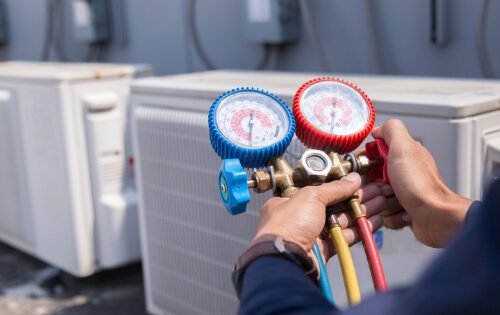5 Common Causes of Air Conditioner Water Leaks
It’s your worst nightmare: you wake up on a sunny summer morning drenched in sweat. Your AC is leaking water and has stopped working. What do you do? Today on the blog, our HVAC Technicians explain 5 Common Causes of AC Leaks.
What Is Causing My Air Conditioner to Leak Water?
There are 5 Common Causes of AC Leaks. If you suspect your AC is leaking, act quickly and do a fast inspection—you may be able to find the problem on your own and prevent a big catastrophe. If your air conditioner is leaking inside or outside your home or apartment, our Sacramento AC Company explains that the problem is most likely caused by at least one of the following:

Drain Line Clog.
The most frequent cause of leaks in residential air conditioners.
Overflow Pan has a Crack.
Examine the overflow pan for dents, gaps, and cracks.
The Air Cleaner is Filthy.
Impeded air passage invites a slew of issues, including water leakage.
Incorrect Installation.
Poor construction is a general cause of a leaking air conditioner.
Pump Has Failed.
A faulty pump will not draw water from the overflow pan and will spill. Continue reading to learn that the air conditioner is running water.
1. A Clog Along the Drain Line
Don’t let your air conditioner get irreparably damaged. The most frequent cause of leaks in home air conditioners is a clogged drain line. When the drain line is clogged, water cannot drain from the overflow pan and out the drainpipe (or outside, depending on the configuration of the AC). This is particularly troublesome for window air conditioners that are bent in the wrong direction. Our Sacramento air conditioning replacement specialists explain that, if water is leaking from the front, you know your AC unit was not properly mounted.
Our team suggests looking for mud and debris in the tubing. Then, clear the blockage if you experience resistance. Afterwards, water will then flow freely into the drainpipe and out the bottom as it should.
As follows, many modern AC systems have an emergency shutoff feature to shield the appliance from failure if a clog in the drain line is observed. While this function is beneficial and avoids water damage, it can be perplexing for an owner when their Air Conditioner device suddenly shuts down. If the air conditioner shuts down unexpectedly, a clogged drain line may be to blame.
Our emergency air conditioning replacement Sacramento explains that you can avoid clogs by dumping a cup of bleach into the drain line from the inside of the device on a regular basis. If a clog has already formed, a wet and dry vacuum should be used to remove it.
2. Cracked or Damaged Drain Overflow Pan
When you’re testing the drain side, you can also search the drain overflow pan underneath the unit. Inspect each corner and edge carefully for gaps, notches, or gaps. Anything that allows water to pour out onto the floor before it reaches the drain hose is a problem.
3. The Air Filter is Clogged
The air filter in your AC should be replaced on a bi-monthly basis. If you keep the filter in for an extended period of time, the filter becomes dusty and air flow is hampered.
As the air inside the evaporator coils becomes too cold, the coils freeze, causing ice to build in and on the device. When the ice melts, water drips and a leak occurs. A clogged duct isn’t the only reason your air conditioner could be freezing up. Thus, see if there are any other potential reasons for why the air conditioner is freezing.
Most filters are designed to last between one and two months, however, it depends where you live. Customers who do not need to change it as frequently since AC’s aren’t in use as much in cooler temperatures. Additionally, check the filters more often to ensure leak prevention, particularly when the device is in heavy use. However, rotating the filter on a daily basis will avoid a slew of problems and improve the efficiency of your AC.
4. Incorrect Installation
If a central air conditioner is not level, it can begin to leak water outside. In the overflow tub, water can spill unevenly and trickle over the rim. Additionally, check that your air conditioner is on a flat, even roof. If it isn’t completely smooth, you can level it by adjusting the concrete pad it rests on.
When using a window air conditioner, the front of the machine can be tilted up slightly enough that the water drains out the back and outside. If the device is too flat, water can flow in the wrong direction and enter your home.
Water can also leak if the seals that hold the device to the window are not properly tightened. However, moisture condenses when warm air meets cool air in the air conditioner, resulting in a condensation spill.
5. Malfunctioning Pump
If the pump fails, no water is taken from the overflow pan. The pan will fill to the point that it starts to spill onto the cement. As follows, pour some water into the pan to test the engine. If nothing happens and you know the drain line is not clogged, the pump is probably disabled. Contact Gilmore Heating, Air and Plumbing one of our service technicians will assist you in replacing the pump.
Contact Gilmore Heating, Air and Plumbing
If you’ve done everything regarding these 5 Common Causes of AC Leaks and your air conditioner is either leaking or won’t turn back on, you can contact Gilmore Heating, Air, and Plumbing. Our specialist HVAC technicians will get your machine up and running leak-free in no time, allowing you to enjoy the season. We can also mount a brand new AC unit the next day if it’s a complete failure!

